Behind our work there is a whole world to discover


Learn more or… get inspired!
Here you can explore our content: events, books, articles, videos, to find out more about our work.
Events: Save the date!
All our events: those we organise, those we are invited to speak at, or simply those we recommend you don’t miss.
#savethedate [08/11/2024] “Let’s peoplerise with Niels de Fraguier”
OKR in Rigoni di Asiago: how do they support the strategy?
Let's peoplerise with... Luca Nascimben | Watch the registration of the
live streaming
Library
We realised that many of the books from which we draw inspiration for our work have not yet been translated into Italian.
Hence our commitment to translations in order to make this valuable knowledge available to all.
#Teal
– REINVENTARE LE ORGANIZZAZIONI. Come creare organizzazioni ispirate al prossimo stadio della consapevolezza umana
– SELF MANAGEMENT: come funziona veramente
#UTheory
– TEORIA U. I fondamentali. Principi e applicazioni
#Agile
– AGILE PEOPLE. Un approccio radicale per HR & manager (che crea dipendenti motivati)
#HorizontalLeadership
– L’ARTE DI CAMBIARE. Pratiche di leadership orizzontale per la business transformation
#JustBanking
– JUST MONEY. La finanza da egosistema a ecosistema
#Embodiment
– SOCIAL PRESENCING THEATER. L’arte di compiere movimenti autentici
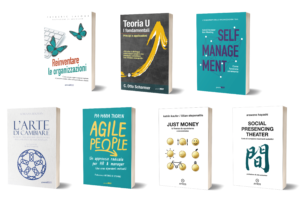
REINVENTING ORGANIZATIONS
reinventare le organizzazioni
#teal #selfmanagement
The way we manage organizations seems increasingly out of date. Survey after survey shows that a majority of employees feel disengaged from their companies. Most of the organisations suffer from power games played at the top and powerlessness at lower levels, from infighting and bureaucracy, from endless meetings and a seemingly never-ending succession of change and cost-cutting programs.
Deep inside, we long for soulful workplaces, for authenticity, community, passion, and purpose. The solution, according to many progressive scholars, lies with more enlightened management. But reality shows that this is not enough. In most cases, the system beats the individual-when managers or leaders go through an inner transformation, they end up leaving their organizations because they no longer feel like putting up with a place that is inhospitable to the deeper longings of their soul.
We need more enlightened leaders, but we need something more: enlightened organizational structures and practices. But is there even such a thing? Can we conceive of enlightened organizations?
The pioneering organizations researched for this book have already “cracked the code.” Their founders have fundamentally questioned every aspect of management and have come up with entirely new organizational methods.
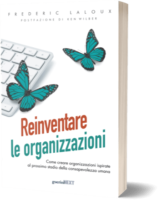
Self-management: How it Does Work
Self-management. Come funziona veramente
#teal #selfmanagement
In a self-managing organization, the team members are collectively responsible for the team result. Team decisions are made by consensus, with each team member also taking individual responsibility for the agreements made. This makes a world of difference to the everyday functioning of the organization. More and more directors are becoming aware of the advantages of self-organisation, but the thought of making changes to the organizational structure seems so daunting that they don’t know where to start. This practical guide explains how to make the transition from hierarchy to self-management. We discuss the implications for team members, team coaches, managers, and supporting staff, as well as the skills they need in order to carry out their work effectively as part of self-organisation. We also give concrete tools to aid in effective communication, such as the Solution Driven Method of Interaction, solution-oriented meetings, and approaches for handling conflict.
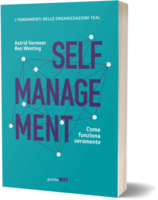
The Essentials of Theory U: Core Principles and Applications
Teoria U: I fondamentali
#Utheory #changemanagement #complexity
This book offers a concise, accessible guide to the key concepts and applications in Otto Scharmer’s classic Theory U. Scharmer argues that our capacity to pay attention co-shapes the world. What prevents us from attending to situations more effectively is that we aren’t fully aware of that interior condition from which our attention and actions originate. Scharmer calls this lack of awareness our blind spot. He illuminates the blind spot in leadership today and offers hands-on methods to help change makers overcome it through the process, principles, and practices of Theory U. And he outlines a framework for updating the “operating systems” of our educational institutions, our economies, and our democracies. This book enables leaders and organizations in all industries and sectors to shift awareness, connect with the highest future possibilities, and strengthen the capacity to co-shape the future.
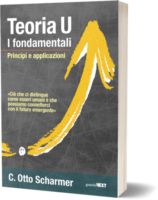
Agile People: A Radical Approach for HR & Managers (That Leads to Motivated Employees)
Agile People. Un approccio radicale per HR & manager (che crea dipendenti motivati)
#agile #HR #collaborations
Corporate cultures, global mindsets, and employee priorities are changing, which means management and human resources departments must also evolve. To ensure teams are well crafted, motivated, and successful, managers and HR professionals must step outside their comfort zone and adapt to younger, newer ways of thinking—they must become Agile.
In Agile People, management consultant Pia-Maria Thoren outlines how managers, human resources professionals, company decision-makers, and employees can adopt the flexible, fluid, customer-focused mindset of modern tech companies to inspire their workers and strengthen their organizations. This essential handbook explains both the theories and practical applications behind the Agile framework, showing how companies can do the following:
•Create a structure and culture for an organization to meet future challenges
•Give management and HR the changed mindset and the tools to facilitate employee drive and performance
•Empower employees to become motivated stakeholders
•Adopt hiring practices that value attitude, behavior, and competence
•Create a passionate, loyal, and accomplished workforce
No matter the size of a company, it can benefit from an Agile mindset and launch into a future filled with successful leadership and motivated employees.
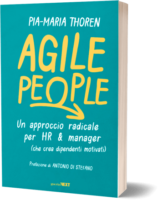
Inside the change: Key Concepts an Exercises of the New Methodology of the Evidential
L’arte di cambiare. Pratiche di leadership orizzontale per la business transformation
#horizontalleadership
All leaders of organizations I meet live with the question: “How can I motivate my people that they deal themselves, out of their own sense of responsibility, with the work challenges they meet, the goals they strive towards, the changes they experience, and that they take the right initiatives?”
Co-workers, I meet in organizations live with the question: “How can I make sure that they will listen to us so that finally we can share the real problems we are facing in the work: what are they all doing up there creating changes all the time?”
In this book, we explore a new methodology for handling the gap between bosses and workers, in particular a methodology that supports the way we deal together with complex changes of organizations, with ‘slow questions’ that have no easy answers. This methodology meets the inner inspiration that shows itself in the outer movement. It is connected to recent developments in social sciences that are characterized in this book. It is also connected to the practices of leaders in organizations that search for and find new ways for dealing with resistant change issues and processes and with ‘slow questions in swampy circumstances’.
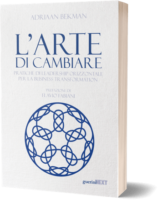
Just Money: Mission-Driven Banks and the Future of Finance
Just money. La finanza da egosistema a ecosistema
#justbanking #ecosystem
Money defines our present and will shape our future. Every investment decision we make adds a chapter to the story of what our world will look like. Although the idea of mission-based finance has been around for decades, there is a gap between organizations’ stated intention to “do good” and meaningful impact. Still, some are succeeding. In Just Money, Katrin Kaufer and Lillian Steponaitis take readers on a global tour of financial institutions that use finance as a force for good.
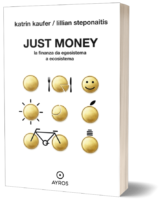
Social Presencing Theater: The Art of Making a True Move
SOCIAL PRESENCING THEATER. L’arte di compiere movimenti autentici
#embodiment
Social Presencing Theatre is a journey into the origins and principles of an innovative social art form co-created by Arawana Hayashi and colleagues at the Presencing Institute at Boston MIT.
This technique of learning through embodiment allows one to see new perspectives for action in implementing the changes one wishes to undertake, not through reflection and debate, but through observing the sensory and relational intelligence of one’s own body.
The methodologies and practical instructions offered by Arawana Hayashi – together with the many examples of their application in companies, organisations, schools, institutions and social projects – offer a valuable new set of tools to those already working as change makers, change leaders or change navigators supporting individuals and communities in recognising their own and others’ innate wisdom in order to draw from it a more fluid courage to act.
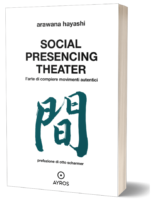
Blog
Do you want to learn more about the development of organisations and the people who work in them?
The Regenerative Enterprise: discover the new Italian edition
Imagine an enterprise that not only sustains the existing, but also regenerates resources, communities and human ties. An enterprise that not only responds to the […]
The biographical approach to understand DEIB topics
In this article, I would like to tell you how the use of a biographical approach can be an effective starting point for delving into […]
What are teal organizations 1
We begin this Teal Journey together by exploring the different organizational paradigms that humans have created over the centuries, leading up to teal organizations. In […]
BRIDGING DIALOGUES 2024: THIRD EDITION!
The topic of BRIDGING DIALOGUES 2024 was “Social regeneration in hyper-digital organisational contexts”. Imagine a world where technologies enhance your skills, instead of replacing them, […]







social